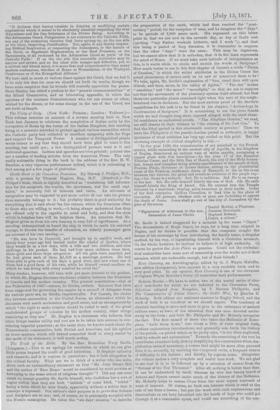talist,' is naturally full of interest and value. An advocate
of emigration may be supposed to put more coulenr de rose into his picture than naturally belongs to it ; but probably there is good authority for everything that is said about the fine carders which the Dominion offers to those who are willing to work,—it being always understood that they are offered only to the capable in mind and body, and that the class which is helpless here will be helpless there. An anecdote that Mr. Ifughea gives us from his own hearing is very full of significance. At a snoeting extemporized on board the ship in which he made his outward voyage, to discuss the benefits of education, an elderly passenger gave an account of his own rearing :— "He was born in Cornwall, and brought up to smith's work, and thirty-four years ago had landed under the citadel of Quebec, where they would be in a fow days, with a wife and two children, and nine shillings in his pocket. lie had had four more children since then, throe girls and three boys altogether. All his girls were married, and he had given each of them $1,500 as a marriage portion. He had been able to give each of his boys a good start, and now every one of them had a good farm of his own, while he himself owned another, on which he was living with every comfort he cared for."
Many readers, however, will turn with yet mere interest to the preface, in which Mr. Hughes discusses the future relation between the Dominion of Canada and the mother country. Tho present constitution—that of the Federation of 1807—cannot, ho thinks, endure. Schemes that have been suggested for governing the empire by a council of delegates from its various parts are, ho thinks, impracticable. For Canada, the choice lies between annexation to the United States, an alternative which he discusses with much moderation and good sense, and an arrangement by which "the right to make treaties should be coded to each of the great confederated groups of colonies by the mother country, other things remaining as they aro." Mr. Hughes is a statesman who believes that ether things besides utility and cost are to bo taken into account in con- sidering imperial questions; at the same time, ho knows much about the Transatlantic communities, both British and American, and his opinion en these matters, which will indeed commend itself to every reader by • the mode of its statement, is well worth noting.






























 Previous page
Previous page